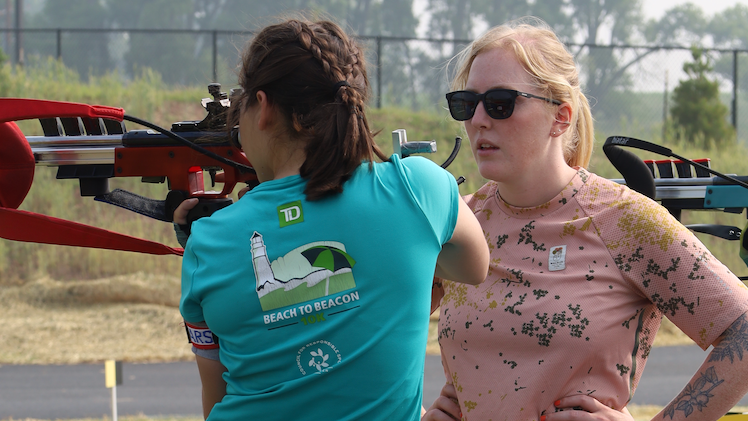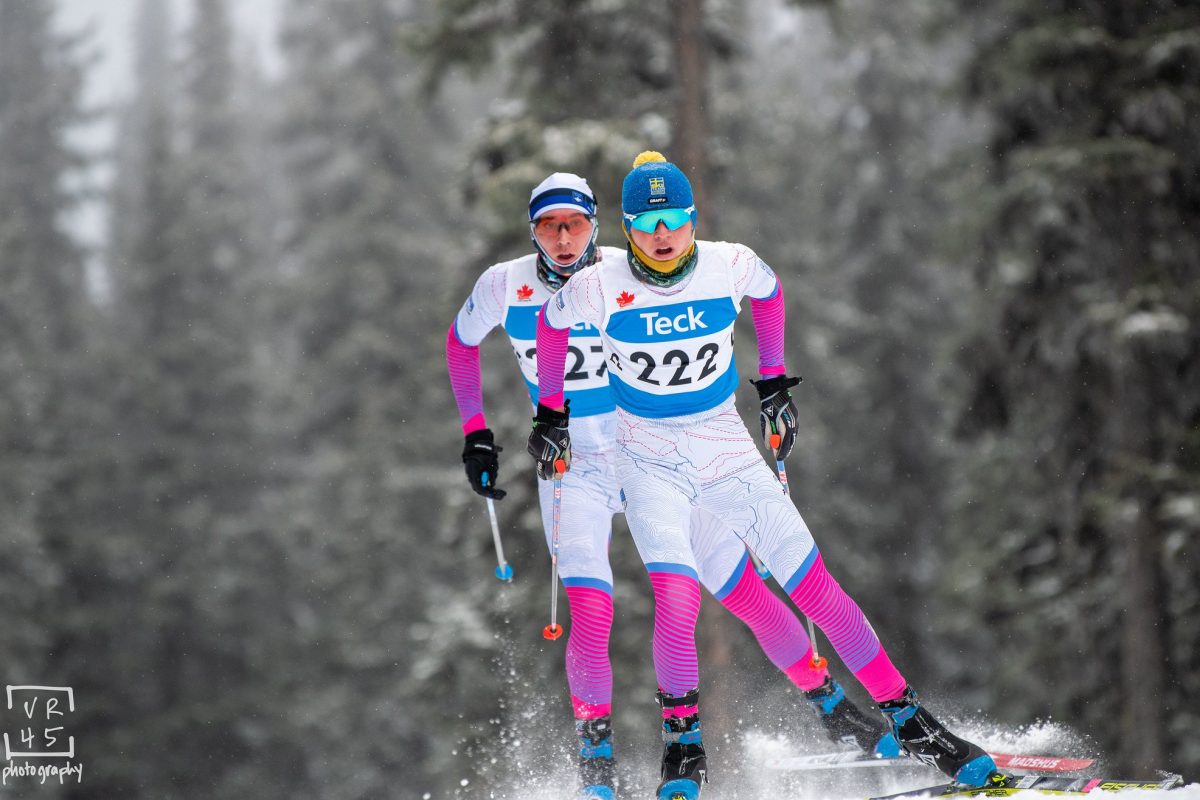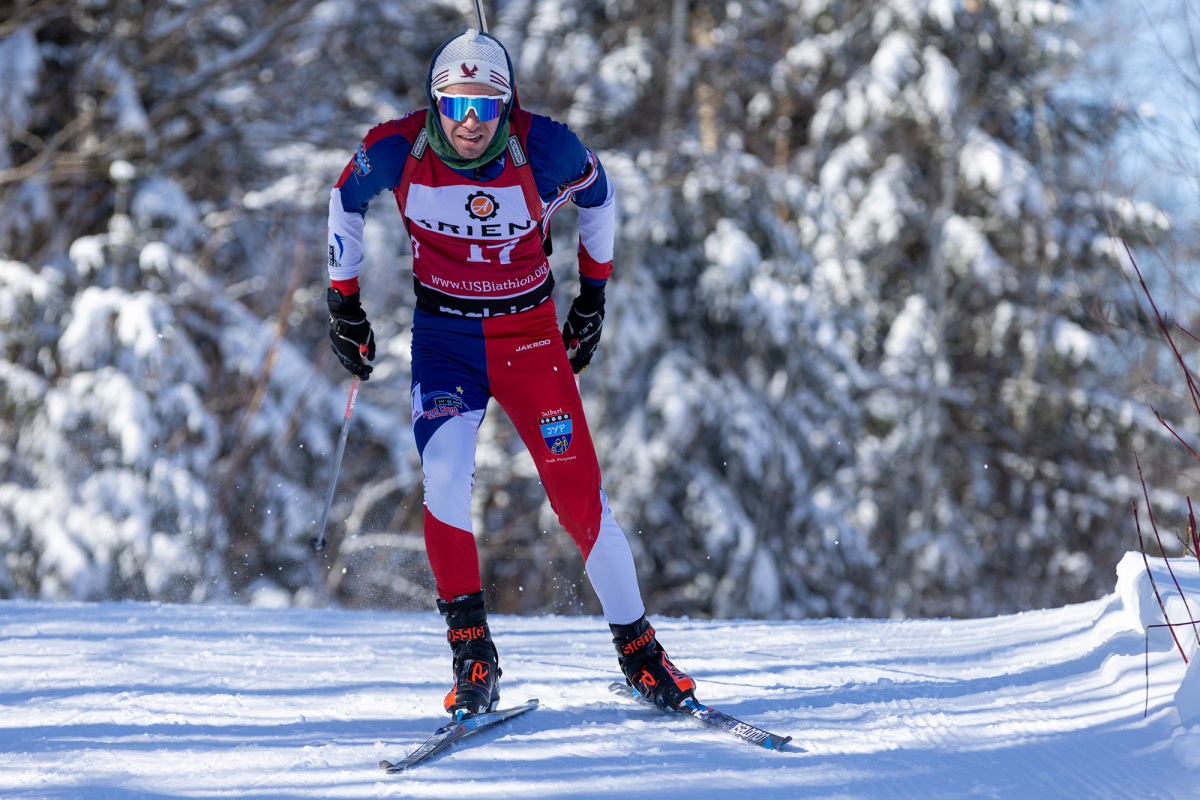
Perhaps never before have the world’s best biathletes’ dreams of perfection been dashed so quickly at the beginning of a season.
Over the last two days in Ostersund, Sweden, each one of the world’s top shooters has missed at least one shot. Usually, there’s just a few races like this in a season. This year, both the men’s and women’s World Cup openers have featured incredibly gusty, unpredictable winds.
Even without shooting clean, a few athletes have been able to turn the weather into pure gold.
“Wind and difficult conditions provide greater opportunities,” explained Canada’s Zina Kocher.
The opportunity was greatest for Darya Domracheva, who picked up the win in Thursday’s 15 k individual by over a minute. While her margin wasn’t quite as large as Frenchman Martin Fourcade’s nearly two-minute victory yesterday, it was still unusual on the World Cup.
“I was very lucky on the shooting range with good conditions,” Domracheva said in a press conference. “It was a very strong wind, and not the same wind for all of the athletes.”
Many of the women could be seen adjusting their sights based on instructions from coaches as the raced onto the shooting range, and even then the wind could shift direction in the blink of an eye, leaving plenty of bullets lodged in the white background of the target rather than the black center where they belonged.
The athletes were left with two options in the ever-changing conditions: try to shoot through the gusts and hope for the best, or wait for the wind to calm down. Neither seemed to be a great strategy.
“I missed my fourth shot in prone because of a big gust and then took a few extra breaths to wait for the wind to die before shooting my last shot,” Kocher said. “Unfortunately, in standing I was not as successful, and maybe should have just been more aggressive and wasted less time. But it’s hard to say.”
Domracheva’s win – the fourth of her career – came despite two missed shots, which in the individual format means two minutes of added time. Domracheva, one of the fastest skiers on the circuit, outskied second-place Anna Maria Nilsson of Sweden, who had only a single penalty. It was Nilsson’s first World Cup podium and came thanks to her strong shooting; she had only the 22nd-fastest ski time of the day.
Magdalena Neuner of Germany finished third with three penalties, and Kaisa Makarainen of Finland placed fourth with four missed shots. Makarainen, who is last year’s overall World Cup champion, was the only woman to ski faster than Domracheva.
While the wind was definitely the race’s defining factor, many of the women said that they also had to get their race-jitters out of the way and that the first race is always a shock in terms of difficulty.
“After the second loop, I was thinking how hard it was today,” Neuner admitted in a press conference.
Domracheva said that she was glad she had raced the IBU Cup last weekend, because she had missed six shots in the less prestigious race and gotten over her nerves.
“I was very focused today,” she said.
North Americans Solid But Uninspired
After last year’s breakout performances by Americans Laura Spector and Sara Studebaker’s and yesterday’s ninth-place finish by Lowell Bailey, it wasn’t unreasonable to guess that the U.S. women might shine in the first race of the season.
But almost immediately, it was clear that it was not to be. Spector – the second racer to hit the course – was caught on her first lap by Norway’s Synnøve Solemdal, who had started thirty seconds back.
Solemdal ended up owning the third-fastest ski time on the day, so it wasn’t exactly a disaster. But then Spector proceeded to miss two shots in her first prone stage, adding two minutes to her time only three kilometers into a 15 k race.
Luckily, her tough luck didn’t extend to the rest of her team. While Studebaker, who led the Americans in 44th place, wasn’t thrilled with her performance, she wasn’t too upset, either.

“Overall, I’m ambivalent about my race,” she wrote in an e-mail. “I had some high points in my shooting and skiing, and some low points. It feels good to get the first race out of the way.”
The North Americans were led instead by Zina Kocher of Canada, who appeared to be returning to form after a disappointing 2011 season. After losing her national “A” team nomination, Kocher left the squad to join a new training center in Alberta, and the move appears to be paying off. Despite seven penalties, she finished 35th.
“It is very abnormal to make World Cup points with seven misses in an individual so I am very grateful for this unexpected occurrence!” she told FasterSkier. “You should always give everything you have skiing regardless of the shooting result, because anything really can happen in biathlon.”
The thing that happened was that Kocher skied fast – really fast. She had the ninth best course time of the day.
“I’m definitely excited for the weekend, and for the rest of the month knowing that my physical form is exactly where I want it to be,” she said. “Today felt very smooth and strong… I was gliding around that course really well today.
“It feels great to be back in Europe, back with the team and back to World Cup racing!”
Kocher’s teammate Megan Imrie finished just a few places behind her in 41st. Imrie missed five shots, but encountered some other challenges along the way.
“My rifle harness came off mid race and I had to stop two different times to fix it,” she wrote in an e-mail. “Total rookie move. I will be triple checking that bolt forever now.”
Despite the technical difficulties, the result was one of the best of her career, and she was just 13 seconds away from collecting World Cup points. She described the Canadians’ skis as “insane” and thanked the technicians for their wizardry.
“I feel like I’ve come a long way in training, and am very stoked to have a great season,” she said.
Although her result wasn’t as good as what she had hoped for, Studebaker wasn’t worried about her performance; her five misses were fairly standard given the conditions and didn’t necessarily reflect any major shooting errors on her part.
“You could see that a lot of people struggled on the range and with this being the first race, I think the results definitely reflect a tough early-season effort,” she said.
Studebaker also noted that she doesn’t usually excel at the beginning of December.
“I’m not usually at my strongest early in the season, and definitely need a few race efforts to get going and find my stride,” she explained. “It was nice to shake the dust off, so to speak. I know my shooting is there and that the skiing will come. I’m looking forward to Saturday and the sprint race.”
Studebaker’s expectations for the day were a reminder of how far the U.S. women’s program has come in just a year. At this time in 2011, Studebaker had only one top-40 finish to her name, and it had come at the Olympics. But over the course of the 2011 season she finished in the points on fifteen separate occasions. Now, finishing out of the top forty feels like the exception rather than the norm.
Studebaker might have been the top American, but it wasn’t by much. In her first-ever World Cup start, Susan Dunklee finished 45th, just over a second behind Studebaker.
She got off to a good start: the rookie had the third-fastest time over the first three kilometers, and then cleaned her first World Cup shooting stage. The move put her in podium position, and she didn’t even know it.

“Wow- good thing nobody told me that during the race,” Dunklee wrote in an e-mail when asked about her first loop.
She swore that her fast start wasn’t completely due to adrenaline from the occasion; it’s just how she skis. Dunklee did her own thing – she was skiing with Neuner for a while, she said, but didn’t realize which German she was following.
“[Women’s coach] Jonne [Kahkonen] had suggested that I treat this race like training, and that took a lot of pressure off,” she explained. “The crowd didn’t bother me, and neither did the lights or cameras. I felt surprisingly relaxed.
“I was very calm and happy on the starting line- there was no place in the world that I wanted to be more than in that stadium tonight.”
Dunklee missed seven shots, like Kocher, and had the 25th-fastest ski time.
“I was hoping for a good launching off point to improve on during the rest of the season,” she said. “This result gives me confidence that I can be competitive in this field on a good day.
“It was a blast!”
Lanny Barnes was close behind in 48th, followed by Rosanna Crawford (CAN) in 70th and Spector in 73rd.




